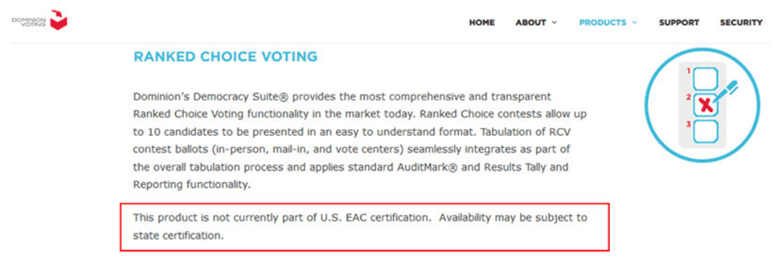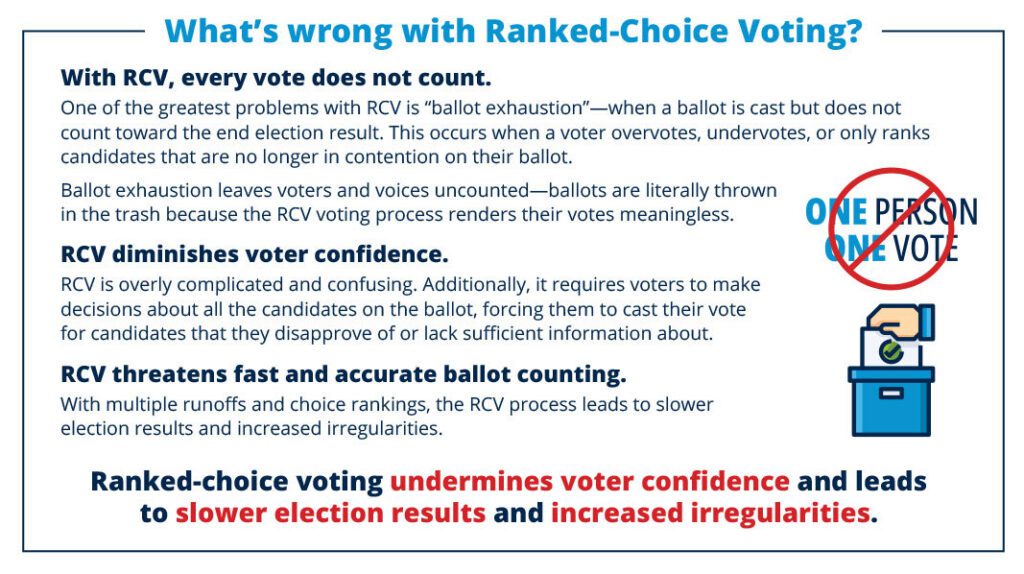As previously reported, New Mexico’s Voting System Certification Committee (VSCC) recently recommended a new voting system be purchased by the Secretary of State, Maggie Toulouse-Oliver, that includes Dominion ICX machines which have never been used in New Mexico. This recommendation was made despite overwhelming public opposition, and the recent release of an expert report written by Democrat Alex Halderman which asserts that serious security vulnerabilities in the Dominion ICX machines can be exploited to subvert the entire election system.
ILLEGAL SOFTWARE
After analyzing the transcript of the VSCC meeting, researcher Ramona Goolsby discovered an inconvenient fact that should prevent the SOS from using the system as a matter of law. That is, if, Toulouse-Oliver cares about following the law in the first place. This fact has to do with a controversial piece of software made by Dominion called Ranked Choice Voting (RCV).
RCV is a complex way to hold an election where voters rank all the candidates in a race from the most preferred to least preferred. Then an “automatic runoff” algorithm is deployed that few understand, and even fewer can explain. After the candidate who ranked “the lowest” is established, that candidate gets dropped, and their votes get redistributed to other candidates. The process continues until the computer declares who the winner is. This video explains the confusing RCV process and how the majority of voters can list a candidate among their bottom two choices, but that candidate can still win the election.
RCV has been severely criticized because it disenfranchises voters by its complexity. Ranked choice elections can be easily gamed by the politically astute against the public with their superior knowledge of how the automatic runoff process works. In other words, unpopular candidates that would lose in a traditional election, are able to navigate the system to accumulate a majority of votes to themselves and the public will not understand how it happened. This has led to some states banning RCV elections altogether.
But setting aside the political implications of RCV, let’s focus only on what is allowed by law. The Help America Vote Act (HAVA) requires all election systems to be certified by a testing lab accredited by the Election Assistance Commission (EAC). The SOS has posted on her website the certification documents for the system she is proposing to use in New Mexico. The document states on page 19, “Although the components of the D-Suite 5.17 are capable of supporting Ranked Choice Voting and Recall Issues, these functionalities are not included in the configuration submitted for certification testing.”
Dominion also states on their website that their Rank Choice Voting module is not certified:

State and federal law are clear: if the software isn’t tested and certified then it can’t be installed.
Imagine our surprise when the Dominion vendor testified at the VSCC meeting, admitting RCV is already installed on New Mexico’s election systems, stating: “So any jurisdiction in the state that so chooses to use the rank choice voting, it’s available in their county system.”
This admission is not only startling because it violates state and federal law, but puzzling as Dominion installed RCV software on all systems throughout the state, where the vast majority of jurisdictions don’t even hold RCV elections.
Unfortunately, the presence of illegal software on the New Mexico system is not a new problem. Concern over the possibility that RCV software was illegally installed statewide was brought to the attention of all county officials and the SOS in a report called “Election Fraud in New Mexico” in October of 2021, when a line item was found for it on invoices from Dominion Voting Systems to the SOS’s office.
Illegal installation was later confirmed by the Otero County Audit through examination of Dominion tabulator system logs which clearly indicated it was not only present, but activated in a county with no RCV elections.
WIRELESS CAPABILITY
There is another statement in the certification document for the Dominion 5.17 system that raises some eyebrows: “No wireless technology is utilized in this system.” It doesn’t say wireless technology isn’t present in the system – just that it isn’t utilized. In fact, wireless technology was found in the Otero County’s central election computer during the Otero County Audit. This wireless technology allowed that election computer to be remotely accessed even without the knowledge of county staff. The SOS blocked Otero County’s ability to inspect the machine to determine whether the wireless technology was utilized before, during, or after the election.
ILLEGAL USE OF 20-YEAR-OLD STANDARD TO “CERTIFY” NEW SYSTEM
But it gets even worse. The SOS is illegally attempting to use a standard that is almost 20 years old to “certify” the new election system which will cost New Mexicans millions more dollars in untrustworthy machines. This isn’t the first time she has improperly “certified” an election system in New Mexico.
Several lawsuits were filed prior to the 2022 midterms against the Secretary of State over the fact that state law required that the SOS certify the election system to the most recent testing standard that had been adopted by the EAC. New Mexico law further requires that any system not in compliance with the most recently adopted standard be decertified as a matter of law.
The testing standards for election systems are called Voluntary Voting System Guidelines (VVSGs) and the most recent version, VVSG 2.0, was adopted by the EAC in 2021, making them the standard that should have been used in New Mexico for the 2022 midterms. However, both the previous election system and the new proposed system are only tested to VVSG 1.0, which was adopted in 2005.
The SOS argued that she did not have to follow the law to certify to VVSG 2.0 for the 2022 midterms because there were no labs in that were certifying to the required standard. While pleading her innocence, she also worked with Senator Daniel Ivey-Soto to quietly change New Mexico law earlier this year to state that she only must test to the most recent standard implemented by the EAC rather than the most recent version adopted by them.
The fact that the SOS and Ivey-Soto were compelled to change the law, implies that they knew they weren’t following it.
After going to all the trouble to change the law to try to give herself cover to continue using an outdated standard, the SOS still can’t legally get away from testing to the current VVSG 2.0 standard because of a July 14, 2023, statement made by the EAC:
“VVSG 1.0 and VVSG 1.1 will no longer be used by the EAC to certify voting systems on November 16, 2023…After that point…all applications for voting systems to be newly certified by the EAC must be for VVSG 2.0…”
The EAC also declares that state statute will determine whether systems already “certified” to old standards can continue to be used. New Mexico State Statute 1-9-7.4.B is clear:
“A voting system that does not comply with all the requirements…of the most recent voluntary voting system guidelines adopted and implemented by the United States Election Assistance Commission shall be decertified for use in this state.”
In other words, the certification of the proposed system will expire in November of this year according to state statute, months ahead of next year’s primary and general election.
If the rule of law still exists at all, the Dominion 5.17 system cannot be implemented in New Mexico. If the SOS and her team of captured, useless bureaucrats charge ahead with wasting millions more of your dollars on the worst machines Dominion ever built without even an attempt at following the law to assure you that they even meet minimum federal standards for security and accuracy, then you’ll know exactly what the SOS thinks about honoring your most precious right – your vote.

- Breaking: Dominion/Liberty Vote Tabulator flips a vote in Chaves County – Changing the Outcome of a School Board Election - December 12, 2025
- Liberation for New Mexico is Coming - August 18, 2025
- ATTENTION DOGE: Department of Energy’s Land Grab in New Mexico and Colorado for “Green Energy” Must be Stopped - February 17, 2025


